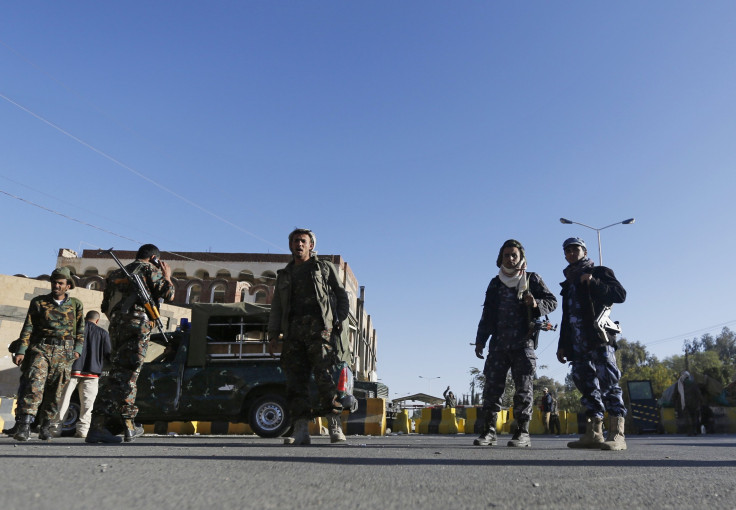Saudi Arabia, Western Nations Close Embassies, Leave Yemen To Growing Chaos

During the past three days, at least seven countries have closed their embassies and evacuated their personnel from Yemen. Among them are Saudi Arabia and the U.S., two of the country’s biggest financial backers and supporters of the government recently ousted by an uprising of Shiite Houthi rebels.
The Houthis seized the capital Sanaa last year. They have since dissolved the parliament and removed President Abed Rabbo Mansour Hadi. The rebels also fiercely oppose U.S. and Saudi Arabian involvement in the country, and are backed by Shiite Iran, Sunni Saudi Arabia’s ideological foe. The simultaneous exodus of diplomats could mean more trouble ahead in a nation already in deep political and financial crisis, and it will hinder the Houthis’ push for international legitimacy.
“Due to the deteriorating security and political situation in the Yemeni capital, Saudi Arabia has suspended all embassy operations in Sanaa and evacuated all its staff, who have arrived safely in the kingdom,” Riyadh said in a statement carried by the official Saudi Press Agency Friday.
The U.S., Britain, France, Germany, Italy and the United Arab Emirates also closed their embassies and evacuated their personnel during the past week. Embassy closings on such a large scale are unusual, and can be a harbinger of chaos. Last year, at least eight countries, including the U.S., shut down their embassies in Libya, which is now in a full-blown civil war that has both boosted homegrown terrorists and flung open the borders for foreign militants.
Closing the embassy could “increase the pressure on the Houthis to withdraw,” Al Jazeera’s Yemen-based correspondent Jamal Elshayyal said Friday. He added that the Houthis need international recognition to succeed, something they would be hard-pressed to get after this week’s mass exodus of embassy personnel.
The Saudi decision to close its embassy along with those of Western governments may be a move meant to discredit the Houthis, the kingdom’s sectarian foes, on the global stage. But Saudi interests aren’t abandoning Yemen altogether, because if nothing else, Yemen sits on the Saudi border, and unrest could spill over.
“The Saudi strategy is no strategy for Yemen. I don’t see one except for security: keeping the border intact and guarding it well,” Jamal Khashoggi, a Saudi journalist, told Reuters.
Saudi Arabia shares a long and mountainous border with Yemen’s southern provinces, a longtime stronghold of al Qaeda in the Arabian Peninsula, the terrorist group’s Yemeni branch. Last month, Saudi officials sped up construction of a wall to keep militants out that will span the 1,060-mile border. It will still take years to complete, the interior ministry told the Saudi newspaper al-Yaum.
Saudi Arabia already had given up a lot of its leverage in Yemen by suspending funding when Hadi stepped down last month. What’s more, the Houthis have been pushing militants out of the northern part of the country toward the south and the Saudi border. This week, al Qaeda made significant gains and, Friday, it captured a Yemeni army brigade.
The U.S. closed its embassy in Sanaa and evacuated all personnel from Yemen Tuesday, citing the same security risks for Americans as Saudi Arabia did. As soon as U.S. officials left the capital, the Houthis seized more than 20 vehicles from the evacuated embassy, Reuters reported.
“They will not let [the] American embassy open again,” said Hussain al-Bukhaiti, a pro-Houthi translator and journalist with familial ties to the group. “With their embassy open, Houthi used to lose support because their followers are really anti-American. They start to question their leaders: ‘Why are you leaving the embassy open if you told us they are bad and they created al-Qaeda?’ So now they closed it. Their job is done.”
Despite the embassy closing, the U.S. still has an unknown number of troops stationed inside the country as part of a counterterrorism operation targeting al Qaeda in the Arabian Peninsula, the Pentagon confirmed.
“I won’t get into how many are there and where they are, but they are there,” Rear Adm. John Kirby, the Pentagon press secretary, said during a briefing Friday, adding that political instability in the country has made intelligence gathering “difficult.”
“It has been affected and in, some cases, curtailed,” Kirby said.
© Copyright IBTimes 2024. All rights reserved.





















